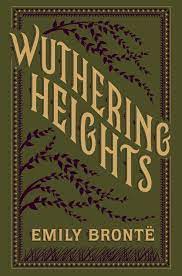Wuthering Heights Page #26
Wuthering Heights is an 1847 novel by Emily Brontë, initially published under the pseudonym Ellis Bell. It concerns two families of the landed gentry living on the West Yorkshire moors, the Earnshaws and the Lintons, and their turbulent relationships with Earnshaw's adopted son, Heathcliff.
“Yes, Heathcliff,” he replied, glancing from me up to the windows, which reflected a score of glittering moons, but showed no lights from within. “Are they at home? where is she? Nelly, you are not glad! you needn’t be so disturbed. Is she here? Speak! I want to have one word with her—your mistress. Go, and say some person from Gimmerton desires to see her.” “How will she take it?” I exclaimed. “What will she do? The surprise bewilders me—it will put her out of her head! And you are Heathcliff! But altered! Nay, there’s no comprehending it. Have you been for a soldier?” “Go and carry my message,” he interrupted, impatiently. “I’m in hell till you do!” He lifted the latch, and I entered; but when I got to the parlour where Mr. and Mrs. Linton were, I could not persuade myself to proceed. At length I resolved on making an excuse to ask if they would have the candles lighted, and I opened the door. They sat together in a window whose lattice lay back against the wall, and displayed, beyond the garden trees, and the wild green park, the valley of Gimmerton, with a long line of mist winding nearly to its top (for very soon after you pass the chapel, as you may have noticed, the sough that runs from the marshes joins a beck which follows the bend of the glen). Wuthering Heights rose above this silvery vapour; but our old house was invisible; it rather dips down on the other side. Both the room and its occupants, and the scene they gazed on, looked wondrously peaceful. I shrank reluctantly from performing my errand; and was actually going away leaving it unsaid, after having put my question about the candles, when a sense of my folly compelled me to return, and mutter, “A person from Gimmerton wishes to see you ma’am.” “What does he want?” asked Mrs. Linton. “I did not question him,” I answered. “Well, close the curtains, Nelly,” she said; “and bring up tea. I’ll be back again directly.” She quitted the apartment; Mr. Edgar inquired, carelessly, who it was. “Some one mistress does not expect,” I replied. “That Heathcliff—you recollect him, sir—who used to live at Mr. Earnshaw’s.” “What! the gipsy—the ploughboy?” he cried. “Why did you not say so to Catherine?” “Hush! you must not call him by those names, master,” I said. “She’d be sadly grieved to hear you. She was nearly heartbroken when he ran off. I guess his return will make a jubilee to her.” Mr. Linton walked to a window on the other side of the room that overlooked the court. He unfastened it, and leant out. I suppose they were below, for he exclaimed quickly: “Don’t stand there, love! Bring the person in, if it be anyone particular.” Ere long, I heard the click of the latch, and Catherine flew upstairs, breathless and wild; too excited to show gladness: indeed, by her face, you would rather have surmised an awful calamity. “Oh, Edgar, Edgar!” she panted, flinging her arms round his neck. “Oh, Edgar darling! Heathcliff’s come back—he is!” And she tightened her embrace to a squeeze. “Well, well,” cried her husband, crossly, “don’t strangle me for that! He never struck me as such a marvellous treasure. There is no need to be frantic!” “I know you didn’t like him,” she answered, repressing a little the intensity of her delight. “Yet, for my sake, you must be friends now. Shall I tell him to come up?” “Here,” he said, “into the parlour?” “Where else?” she asked. He looked vexed, and suggested the kitchen as a more suitable place for him. Mrs. Linton eyed him with a droll expression—half angry, half laughing at his fastidiousness. “No,” she added, after a while; “I cannot sit in the kitchen. Set two tables here, Ellen: one for your master and Miss Isabella, being gentry; the other for Heathcliff and myself, being of the lower orders. Will that please you, dear? Or must I have a fire lighted elsewhere? If so, give directions. I’ll run down and secure my guest. I’m afraid the joy is too great to be real!” She was about to dart off again; but Edgar arrested her. “You bid him step up,” he said, addressing me; “and, Catherine, try to be glad, without being absurd. The whole household need not witness the sight of your welcoming a runaway servant as a brother.” I descended, and found Heathcliff waiting under the porch, evidently anticipating an invitation to enter. He followed my guidance without waste of words, and I ushered him into the presence of the master and mistress, whose flushed cheeks betrayed signs of warm talking. But the lady’s glowed with another feeling when her friend appeared at the door: she sprang forward, took both his hands, and led him to Linton; and then she seized Linton’s reluctant fingers and crushed them into his. Now, fully revealed by the fire and candlelight, I was amazed, more than ever, to behold the transformation of Heathcliff. He had grown a tall, athletic, well-formed man; beside whom my master seemed quite slender and youth-like. His upright carriage suggested the idea of his having been in the army. His countenance was much older in expression and decision of feature than Mr. Linton’s; it looked intelligent, and retained no marks of former degradation. A half-civilised ferocity lurked yet in the depressed brows and eyes full of black fire, but it was subdued; and his manner was even dignified: quite divested of roughness, though stern for grace. My master’s surprise equalled or exceeded mine: he remained for a minute at a loss how to address the ploughboy, as he had called him. Heathcliff dropped his slight hand, and stood looking at him coolly till he chose to speak. “Sit down, sir,” he said, at length. “Mrs. Linton, recalling old times, would have me give you a cordial reception; and, of course, I am gratified when anything occurs to please her.” “And I also,” answered Heathcliff, “especially if it be anything in which I have a part. I shall stay an hour or two willingly.” He took a seat opposite Catherine, who kept her gaze fixed on him as if she feared he would vanish were she to remove it. He did not raise his to her often: a quick glance now and then sufficed; but it flashed back, each time more confidently, the undisguised delight he drank from hers. They were too much absorbed in their mutual joy to suffer embarrassment. Not so Mr. Edgar: he grew pale with pure annoyance: a feeling that reached its climax when his lady rose, and stepping across the rug, seized Heathcliff’s hands again, and laughed like one beside herself. “I shall think it a dream to-morrow!” she cried. “I shall not be able to believe that I have seen, and touched, and spoken to you once more. And yet, cruel Heathcliff! you don’t deserve this welcome. To be absent and silent for three years, and never to think of me!” “A little more than you have thought of me,” he murmured. “I heard of your marriage, Cathy, not long since; and, while waiting in the yard below, I meditated this plan—just to have one glimpse of your face, a stare of surprise, perhaps, and pretended pleasure; afterwards settle my score with Hindley; and then prevent the law by doing execution on myself. Your welcome has put these ideas out of my mind; but beware of meeting me with another aspect next time! Nay, you’ll not drive me off again. You were really sorry for me, were you? Well, there was cause. I’ve fought through a bitter life since I last heard your voice; and you must forgive me, for I struggled only for you!”
Translation
Translate and read this book in other languages:
Select another language:
- - Select -
- 简体中文 (Chinese - Simplified)
- 繁體中文 (Chinese - Traditional)
- Español (Spanish)
- Esperanto (Esperanto)
- 日本語 (Japanese)
- Português (Portuguese)
- Deutsch (German)
- العربية (Arabic)
- Français (French)
- Русский (Russian)
- ಕನ್ನಡ (Kannada)
- 한국어 (Korean)
- עברית (Hebrew)
- Gaeilge (Irish)
- Українська (Ukrainian)
- اردو (Urdu)
- Magyar (Hungarian)
- मानक हिन्दी (Hindi)
- Indonesia (Indonesian)
- Italiano (Italian)
- தமிழ் (Tamil)
- Türkçe (Turkish)
- తెలుగు (Telugu)
- ภาษาไทย (Thai)
- Tiếng Việt (Vietnamese)
- Čeština (Czech)
- Polski (Polish)
- Bahasa Indonesia (Indonesian)
- Românește (Romanian)
- Nederlands (Dutch)
- Ελληνικά (Greek)
- Latinum (Latin)
- Svenska (Swedish)
- Dansk (Danish)
- Suomi (Finnish)
- فارسی (Persian)
- ייִדיש (Yiddish)
- հայերեն (Armenian)
- Norsk (Norwegian)
- English (English)
Citation
Use the citation below to add this book to your bibliography:
Style:MLAChicagoAPA
"Wuthering Heights Books." Literature.com. STANDS4 LLC, 2024. Web. 29 Nov. 2024. <https://www.literature.com/book/wuthering_heights_1627>.




Discuss this Wuthering Heights book with the community:
Report Comment
We're doing our best to make sure our content is useful, accurate and safe.
If by any chance you spot an inappropriate comment while navigating through our website please use this form to let us know, and we'll take care of it shortly.
Attachment
You need to be logged in to favorite.
Log In